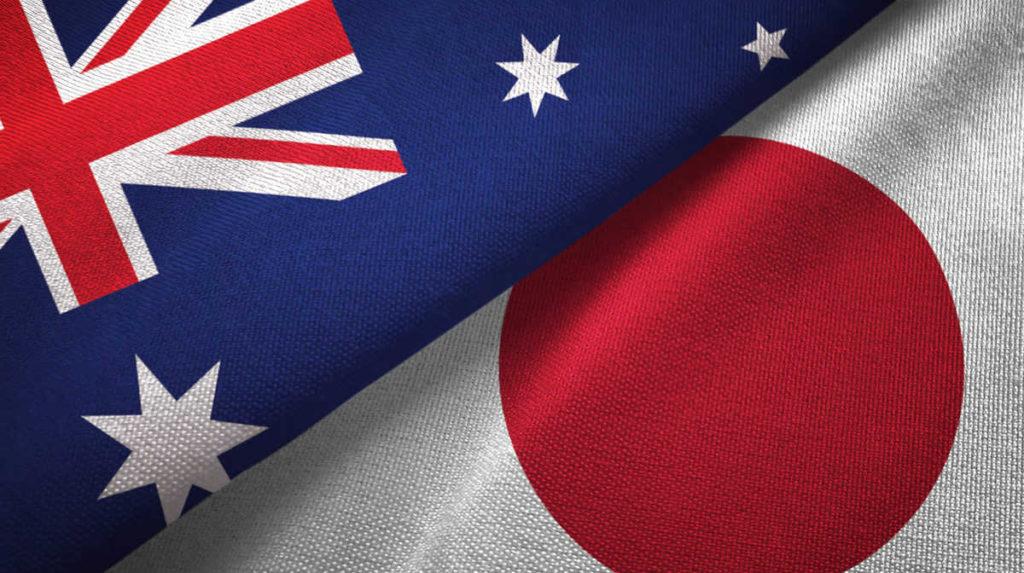
Australia and Japan flags together relations textile cloth, fabric texture
The Australian and Japanese prime ministers met virtually on Jan. 6 and signed a Reciprocal Access Agreement (RAA) that makes it easier for each nation’s troops to operate in each other’s country.
As important, it strengthens the political and psychological groundwork for increased military cooperation between the two nations.
The Good News
It’s the first such agreement Japan has signed with a country besides the United States. And it took a while.
An agreement in principle was reached in November 2020 between Japan’s then-Prime Minister Yoshihide Suga and Australian Prime Minister Scott Morrison—after six years of negotiating. It took another 14 months to finalize the deal.
The door is now open wide in both directions for practically any initiative the two sides desire.
One should remember, however, that the Japanese and Australian militaries are not strangers. Japanese forces have been training in Australia since the early 2010s, to include sending ships and troops to Talisman Saber and other exercises. Japanese ships have also exercised alongside the Australian Navy in the Indian Ocean Malabar Exercise and in the South China Sea.
Individual Australian Defense Force personnel have been assigned to Japan for decades. And Royal Australian Air Force (RAAF) aircraft have used U.S. bases in Japan (under United Nations auspices) in recent years while enforcing North Korea sanctions. And in September 2019, a detachment of Australian F18s conducted a first-ever joint combat exercise with the Japan Air Self-Defense Force (JASDF) in Japan.
A decade ago, most observers considered a Japan-Australia RAA and all the above activities to be impossible.
Chinese threats, pressure, and saber rattling do indeed have a silver lining.
Military Opportunities
Now that the deal has been signed, the important thing is what both sides make of it.
Are there some easy things to move things forward?
An Australian Army liaison officer is now assigned to the Japanese Army’s Ground Combat Command (GCC) in Japan. But that’s not so useful. It will be better to see an Australian Liaison Officer or two assigned to Japan Self-Defense Force (JSDF) headquarters in Tokyo.
The right officers, doing some pushing and persuading—and with some help from the U.S. Marines and U.S. Navy–can move the Australia-Japan defense relationship forward on a far broader front than just “army to army.”
And when the Americans and Japanese finally establish a joint headquarters in Japan (hopefully before hell has frozen over), the Australians should be an integral part of it.
Another helpful initiative would be deploying a RAAF squadron to Japan on long-term deployment and, vice versa, a JASDF squadron to Australia. Bringing the Australian Army and Navy to exercise in Japan is also easy.
Besides the favorable “optics” of the Japan Self-Defense Forces and Australian Defense Force (ADF) operating together, the JSDF benefits from deeper exposure to another military and different ways of doing things. And both benefit from the psychological and political ties that come of deeper military-to-military relations.
The JSDF absolutely needs opportunities for realistic training to better professionalize itself. It can’t do this in Japan owing to limited training areas and excessive local restrictions.
Australia offers excellent opportunities for all three JSDF services to train by themselves, together, and with other militaries.
Australia’s Northern Territory, in particular, is the best place in the entire hemisphere for the sort of unrestrained, combined arms training that Japan desperately needs. JSDF’s only other alternative is to make the trip to Southern California—and even then, U.S. training facilities are not as good as those in the Northern Territory.
Here’s one idea: combine Japanese and Australian amphibious forces into a “joint task force” to master the complex air/sea/ground coordination that is part and parcel of amphibious operations—but also applicable to a range of military operations.
Click HERE to read more.
- Trump Attempting to ‘Flip the Script’ on CCP Leader Xi With Inauguration Invite: Grant Newsham - December 17, 2024
- Defense experts predict Philippines will join future Yama Sakura military drills - December 15, 2024
- No Smoking Gun in South Korea to Warrant Martial Law, but Evidence of CCP’s ‘Entropic Warfare’: Grant Newsham - December 8, 2024
